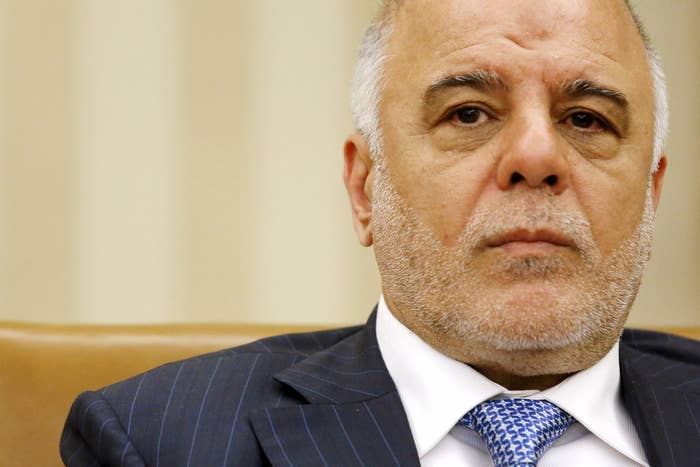
WASHINGTON — There are currently dozens of groups fighting against ISIS in Iraq, some of which are committing human rights abuses, but please don’t call them “militias,” Iraqi Prime Minister Haider al-Abadi said on Wednesday.
“Militias, according to the [Iraqi] Constitution, according to us, are the enemy of the state,” he said in a small roundtable with reporters. “Militias are an organization who are outside the state who carry arms, not under the control of the state,” he said. “They are not allowed.”
(A quick Google search shows that a common definition of a militia is “a military force that is raised from the civil population to supplement a regular army in an emergency.”)
Dozens of Shiite militia have joined the fight against ISIS as the Iraqi military remains overwhelmed in its struggle to push back the terror group. Reports of human rights abuses committed by some of them — namely against Iraq’s Sunni population — have added to worries about their potential treatment of non-Shiite Iraqis if they manage to expel ISIS. The Iraqi government has been increasingly dominated by the country’s Shiite majority, to the concern of Sunni and Kurdish Iraqis.
Abadi insisted that the militia were not seeking to gain control in Iraq. “Nobody within these groups want to challenge the state or want to appear in the public eye that they challenge the state,” he said. “They all claim to be under the state. In fact, some of them [claim that] falsely. And if we catch them, we put them in prison.”
For months now, Iraq has been attempting to retake the territory it lost during ISIS’s lightning quick surge last year with no signs that the militant group is close to defeat, even with the support of dozens of militia on the ground who are estimated to have nearly 100,000 fighters among them. Among their ranks are Asai'b uhl al-Haq, which is reportedly led by the head of Iran’s Quds Force, and the reconstituted version of the Mahdi Army — both of which fought against the American forces during the period after the U.S.-led invasion. Some are backed by Iran. In the latest operation to retake the majority-Sunni city of Tikrit, the United States found itself launching airstrikes in support of the militia's campaign, despite their ignoring American demands to withdraw.
There’s also uncertainty about how much power the militia — many of which receive considerable backing from Iran in the form of weapons, training, and support from military advisers on the frontlines — will be willing to cede if they manage to defeat ISIS. Abadi claimed there are only 110 Iranian advisers on the ground in Iraq, but U.S. officials worry that the number is much higher given that 20,000 of the 24,000 troops used to retake Tikrit were militia fighters. Meanwhile Iranian commanders like Qassem Soleimani haven’t hidden the fact that they’re moving freely around Iraq.
Advocacy groups like Human Rights Watch have documented instances of militia expelling Sunnis from their homes and destroying buildings after driving out ISIS, such as in the Iraqi town of Amerli. Human Rights Watch has also documented evidence of summary executions and other possible war crimes carried out against captives.
Abadi is on his first trip to the U.S. since becoming prime minister in September, aiming to shore up U.S. support in the fight against ISIS. He met with President Barack Obama, Vice President Joe Biden, and Secretary of State John Kerry in separate meetings on Tuesday. He was due to meet Secretary of Defense Ash Carter and congressional leaders later Wednesday.
Speaking on Tuesday after meeting with President Obama at the White House, Abadi said that those caught committing human rights abuses would be prosecuted. “I have to admit that there are some violations, human rights violations, being committed by some criminal parties and outliers, but we have zero tolerance for any violations of human rights,” Abadi said. “And when we manage to catch these people, we are bringing them before the judicial system and we punish them.”
Last week, Reuters reporter Ned Parker fled Baghdad after receiving threats from Shiite militia based on his reporting on their abuses in Tikrit. The Iraqi government said in a statement Tuesday that it takes its commitment to protect reporters seriously. Yet there are no signs it has managed to reign in those who issued the threats.
Abadi said the militia fighting alongside the Iraqi Army would be brought under his control in his role as Iraq’s commander-in-chief, which would allow for them to be prosecuted in military courts rather than under civilian law. He did not elaborate on how this system would work in practice.
Abadi said there are currently seven men being prosecuted in Anbar province, for example, after an incident in which they allegedly killed a group they had stopped at an ad-hoc checkpoint. “They may have killed terrorists, I don’t know,” he said. “But they should not have taken the law into their own hands.”
He said there are dozens of cases being investigated in Tikrit, though he declined to provide exact numbers.
But the problem of controlling the militia remains. While they’re aiding in the fight, they are also fueling chaos, and even the Iraqi government has trouble knowing which militia any fighter the Iraqi army arrests is working for at any given time. “You never know who they belong to,” he lamented. “They claim to belong to [Kata'ib Hezbollah], to [Asa'ib Ahl al-Haq], to other groups. But once they are arrested and put in prison, the people when you ask them, they say, ‘They don’t belong to us.'”
So what would Abadi prefer to call the militia? “Those who are fighting within the state are under the umbrella of Public Mobilization Forces,” Abadi said. “This is a legal entity now because even Parliament has approved of it.”
